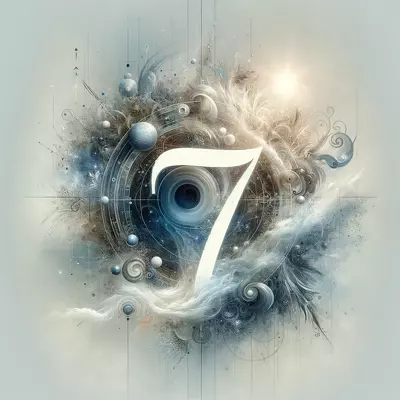Mysticism Meets Mathematics: What Does the Number 13 Mean Spiritually?

The number 13 holds a potent vibration in spiritual circles, often shrouded in mystery and intrigue. Across various cultures and religions, this digit has been linked to transformation, rebirth, and divine feminine energy. While many fear its association with bad luck, others see it as a symbol of change and growth. Spiritually, understanding the essence of 13 can provide a deeper insight into the universe’s mystic rhythms.
I. Introduction
For eons, the number 13 has maintained a special seat in the realm of mysticism and spiritual exploration. This number has sparked interest, fear, reverence, and curiosity across various civilizations and cultures.
A. Brief overview of the number’s mystical reputation
From the quiet whisperings in the corners of ancient halls to the pronounced superstitions in modern high-rises, the number 13 has consistently been a topic of intrigue. It has been revered by some while simultaneously feared by others, often shaping behaviors, beliefs, and practices.
B. The balance between its perceived positive and negative associations
Interestingly, the associations with the number 13 are not solely negative or positive but a mix of both. On one hand, it’s shunned in many modern buildings which skip the 13th floor or avoided in dinner party guest lists. Yet, on the other hand, it’s considered a powerful number in certain spiritual traditions, symbolizing transformation, rebirth, and divine energy.
II. Historical Perspectives of the Number 13
Delving into history, we discover that the connotations attached to the number 13 have evolved, often influenced by religious narratives, cosmic events, and societal beliefs.
A. Ancient civilizations and their interpretations
For the Mayans, 13 was a sacred number, representing completion, as evidenced by their calendar systems. In their cosmology, the Egyptians perceived life as a journey of 12 stages, with the 13th stage signifying the afterlife and transformation. Meanwhile, in the ancient city of Babylon, the Code of Hammurabi allegedly skipped the number 13, possibly indicating an early superstition surrounding it.
B. Connection of the number 13 with lunar cycles and the feminine divine
In many ancient cultures, lunar cycles were integral in shaping the calendar and influencing beliefs. There are approximately 13 lunar cycles in a year, so this number became intrinsically linked with the moon and its energies. This connection often associates 13 with the divine feminine, as the moon is frequently personified as a goddess or female energy in various mythologies.
C. Suppositions behind common superstitions, such as the ‘unlucky 13’
The trepidation surrounding the number 13 in certain cultures can often be traced back to religious or mythological tales. One of the most well-known stories comes from Norse mythology, where a banquet in Valhalla was disrupted by the uninvited 13th guest, Loki, leading to chaos. Similarly, in Christian tradition, the Last Supper had 13 individuals present, with Judas Iscariot, the one who would betray Jesus, being the 13th member to sit. Such stories have contributed to the ‘unlucky 13’ sentiment that persists in parts of the world today.
III. Number 13 in Different Religious and Spiritual Traditions
Throughout history, various religious and spiritual traditions have ascribed significance to numbers, using them as symbolic expressions of deeper truths. The number 13, due to its unique vibrational energy, has consistently been a point of focus across many of these traditions.
A. Christian symbolism: The Last Supper and Judas Iscariot
Within Christianity, 13 bears a distinct symbolic meaning, primarily due to the Last Supper narrative. Twelve apostles were present along with Jesus, making the total count 13. Judas Iscariot, the apostle who betrayed Jesus, is said to have been the last to join the table, rendering him the 13th guest. This sequence of events led to an association of 13 with betrayal, thus influencing the perspective on this number in many Christian-influenced cultures.
B. Norse mythology and the banquet in Valhalla
In Norse mythology, the gods held a banquet in Valhalla, with 12 main deities in attendance. However, Loki, the trickster god, gatecrashed as the 13th guest. His unexpected presence led to a series of events culminating in the death of the beloved god, Balder. This story further solidified the belief in the disruptive nature of the number 13.
C. Jewish tradition: Bar and Bat Mitzvahs
In Jewish tradition, the age of 13 holds significant value. For boys, turning 13 is marked by the Bar Mitzvah ceremony, signifying their coming of age and assuming religious responsibilities. For girls, this transition is celebrated with the Bat Mitzvah at 12 or 13, depending on the denomination. This positive connotation contrasts with many other traditions, underscoring the age’s spiritual importance.
D. Other world religions and their interpretations
Across the world, the number 13 manifests in various religious narratives. For instance, in Sikhism, the number 13, pronounced as ‘tera’ in Punjabi, signifies “yours,” referring to everything belonging to the Divine. Meanwhile, in certain indigenous cultures, 13 is revered due to its alignment with lunar cycles and natural rhythms.
IV. Numerology and the Number 13
Numerology, the esoteric study of numbers and their influence on human life provides a distinctive perspective on the number 13, veering away from mere superstitions.
A. Decoding the vibrations of numbers
In numerology, every number possesses a unique vibration, influencing various aspects of existence. These vibrations shed light on personality traits, life paths, and cosmic design.
B. The characteristics associated with the number 13
Despite the common trepidation, in numerology, the number 13 is seen as powerful and transformative. Breaking it down, it consists of 1 (symbolizing leadership and assertiveness) and 3 (indicative of communication and creativity). When combined, the energy converges to denote growth, change, and the ability to overcome challenges.
C. Transition, transformation, and rebirth as tied to the number
The 13’s vibrational essence encapsulates cycles of transformation and rebirth. It beckons the shedding of the old to embrace the promise of new beginnings. For many, understanding this deeper, positive essence of 13 is a counter-narrative to widely held superstitions, highlighting its spiritual significance in guiding personal evolution.
V. Contemporary Views on the Number 13
In the ever-evolving landscape of the modern era, views surrounding the number 13 have taken intriguing turns, oscillating between its traditional reverence and newfound representations.
A. Modern spirituality and the renewed interest in numerology
As people seek deeper connections with themselves and the universe, there’s been a resurgence in interest in ancient practices like numerology. The number 13, with its rich tapestry of meanings, has emerged as a focal point for many spiritual seekers. New-age practitioners often highlight its transformative power, promoting its positive attributes rather than the commonly held negative superstitions.
B. 13 in pop culture: from horror films to spiritual retreats
Pop culture has always had a fascinating relationship with the number 13. The ‘unlucky 13’ trope is popular in horror films, underscoring its ominous reputation. Yet, in stark contrast, spiritual retreats and workshops often incorporate the number, using its vibrational energy as a beacon for transformation and enlightenment.
C. The pushback against traditional superstitions in today’s society
With the rise of rationalism and scientific inquiry, many age-old superstitions surrounding the number 13 are being challenged. Buildings are reintroducing the 13th floor, and events scheduled on the 13th are no longer taboo. This shift represents a broader societal move towards embracing tradition while redefining its significance in contemporary contexts.
VI. FAQs
Q: Why is the number 13 considered unlucky in some cultures?
A: Historically, certain events and myths, such as Judas being the 13th guest at the Last Supper or Loki disrupting the banquet in Norse mythology, have contributed to the negative connotations associated with the number 13.
Q: How does numerology interpret the number 13?
A: In numerology, 13 is a powerful symbol of transformation and rebirth. It combines the energies of numbers 1 and 3, denoting leadership, communication, and creativity.
Q: Does the number 13 always have negative implications in spiritual traditions?
A: No; while some traditions associate the number 13 with negative events, others, like certain indigenous cultures and Sikhism, view it in a positive or neutral light, often tied to natural rhythms or divine belonging.
Q: Why is there a modern resurgence in interest around the spiritual significance of numbers?
A: The modern era has witnessed a renewed quest for personal growth, self-awareness, and deeper cosmic connections. This has led to a resurgence in practices like numerology that offer insights into life’s design and individual purpose.
Q: How is the number 13 represented in popular culture today?
A: Due to its ominous reputation, the number 13 remains a popular motif in horror and suspense. However, it’s also appearing in more positive contexts, like spiritual retreats and self-help books, emphasizing its transformative potential.
Q: What is the significance of the number 13 in relation to lunar cycles?
A: There are approximately 13 lunar cycles in a year. This connection has led to the number 13 being associated with the moon, feminine energy, and the rhythms of nature in various cultures.
Q: Are any modern movements challenging the superstitions surrounding the number 13?
A: Yes, with the global shift towards rational thinking and empirical evidence, many superstitions, including those about the number 13, are being questioned. This has led to the number being re-embraced in modern architecture, events, and culture, shedding its previously negative image.
VII. Conclusion
As we journey through the corridors of history, myths, religious doctrines, and pop culture, one realization stands clear: 13 is not merely a digit but a dynamic symbol with myriad interpretations and energies.
A. A call to appreciate the number’s rich spiritual tapestry
It’s essential to view the number 13 beyond its surface-level superstitions and delve deeper into its spiritual tapestry. Each tradition, myth, and story offers a nuanced understanding, urging us to appreciate its multifaceted significance. Whether it’s the Mayans venerating its sacredness, the narratives of the Last Supper, or modern numerologists emphasizing its transformative energy, the number 13 demands reverence and understanding.
B. The continued relevance of 13 in spiritual quests and personal growth
The beauty of spiritual symbols lies in their timeless nature. As the world evolves, so does our understanding and relationship with such symbols. The number 13, despite its tumultuous history, remains relevant, especially for those on spiritual quests. Its essence, rooted in transformation, rebirth, and cycles, resonates with the human journey of growth, challenges, and enlightenment. In pursuing personal evolution, the mystique of 13 offers insights, guidance, and a touch of the cosmic dance that governs existence.
VIII. Suggested Readings
Embarking on a journey of understanding the profound significance of numbers, especially in spirituality, can be both enlightening and transformative. While our exploration into the number 13 has provided a foundational understanding, a treasure trove of deeper insights is waiting to be discovered. For those eager to dive deeper, here are some essential reads that delve into the mysteries of numerology and the profound significance of numbers:
- Numerology: The Secret Language of Numbers and Its Spiritual Significance by David A. Phillips. David A. Phillips, in this compelling read, unravels the esoteric significance of numbers, offering readers a unique perspective on their spiritual implications. It’s a definitive guide for anyone understanding the universe’s numerical dance.
- The Complete Book of Numerology: Discover the Hidden Meaning of Numbers in Your Life by David A. Phillips. A comprehensive exploration of numerology, this book offers readers a detailed guide on the vibrational essence of numbers and how they influence personal life paths, destinies, and characteristics.
- The Secret Language of Birthdays: Your Complete Personology Guide for Each Day of the Year by Gary Goldschneider. Goldschneider masterfully blends astrology, numerology, and tarot in this intricate guide, offering readers detailed insights into their unique personal energies based on birthdays. It’s a fascinating delve into the subtle forces that shape our lives.
- Karmic Debt 13/4: The Complete Guide (The Power of Numerology: Karmic Debt Numbers 13/4, 14/5, 16/7 and 19/1) by Felicia Bender. Focusing on karmic debts, Felicia Bender dives deep into the numbers, indicating challenges stemming from past lifetimes. The exploration of 13/4, in particular, offers profound insights into the transformative energy associated with this number.
- The Mystery of Numbers by Annemarie Schimmel. A scholarly and thoughtful exploration, Schimmel decodes the mystical nature of numbers across various cultures and traditions. It’s a captivating journey that connects numerology to broader themes of mythology, religion, and human consciousness.
The realm of numerology is vast, intriguing, and spiritually enlightening. These recommended reads can help you better understand the numbers that weave the fabric of existence.






